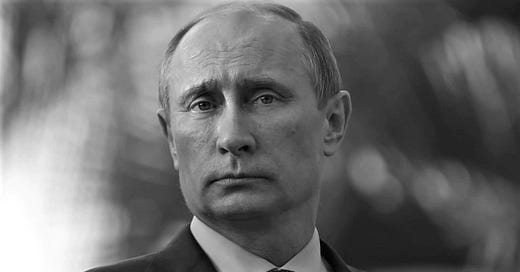Can Putin Be Overthrown?
Russia's long history of palace coups raises the question: Is Putin next?
This week’s post is from contributor Ryan Favro.
When Russia invaded Ukraine in February 2022, victory was expected in a matter of days, if not hours. Four months later, the fighting is ongoing. With Russia’s struggling war effort and the battery of crippling international sanctions tanking its economy, Western media and analysts of the region have begun speculating about the potential of a “palace coup” — a coup by state elites — to overthrow Vladimir Putin.1 2 It wouldn’t be without historical precedent. Multiple times in its history, Russian governing power has been wrested from the hands of its leader by coups stemming from a collapse in support among elites — especially within the military and security services — and on occasion the population as well. In times of failed wars or steep economic downturns, coups often leading to the pressured resignation or even death of the ruler have been regular go-to’s in the Russian repertoire.
A Brief History of Russian Coups
During the Tsarist era, several monarchs were forcibly removed from power. The palace coups in the 18th century involved challengers who had risen through military alliances to overthrow the sitting ruler.3 In 1762, Catherine the Great, with the aid of military officer Grigory Orlov, her ally and lover, as well as his influential family, gained the support of Russia’s most formidable military regiment. Together, they removed Catherine’s husband, Tsar Peter III, from power only six months into his reign, resulting in her becoming Tsarina.4 5 Peter, caught off-guard by Catherine’s actions, was arrested and forced to sign a statement of abdication. Eight days later he was murdered. It’s uncertain who killed Peter, though historians suspect that Alexi Orlov — Grigory’s brother — did the deed. In the aftermath, the state claimed that he died from natural causes.6
Tsar Paul I, the son of Catherine the Great, later faced a palace coup in 1801, and was assassinated at the hands of Russian military officers and disaffected courtiers7. Paul had enacted laws limiting the authority of the nobility in order to strengthen his autocracy, which earned him many powerful enemies. When he then imposed strict disciplinary measures on Russia’s military, the two aggrieved parties joined forces to overthrow him.8
A little over a century later, the Russian Revolution of 1917 (including both the pre-communist February Revolution and the communist October Revolution), occurred amid military failures and economic crisis during Russia’s involvement in World War I. In the run-up to the Russian Revolution, it appeared that a palace coup was on the verge of happening that would overthrow Tsar Nicholas II and replace him — either with a close Romanov relative, or a regent who would rule on behalf of Nicholas II’s young son Alexander. One way or the other, dramatic changes were in store.9
Even during the Soviet era, Nikita Khrushchev faced a palace coup in 1964 led by rival elites in the Communist Party leadership, including Leonid Brezhnev, who would emerge as the next dictator after several years. Khrushchev’s overthrow was made possible with the help of the KGB.10 His political policies had alienated members of the Party leadership, and his agricultural reforms were deemed a failure responsible for civil unrest against the Communist regime.11 Among the decisions his opponents saw as dangerous and destabilizing, Khrushchev’s handling of the 1962 Cuban Missile Crisis was the last straw.12 The KGB, no longer loyal to Khrushchev, began bugging his phones.13 Former KGB chief Alexander Shelepin, along with Brezhnev, were the principal architects of the coup that followed.14
While Khrushchev was on vacation in Crimea, Brezhnev urgently summoned him by telephone to return to Moscow for a special meeting of the Presidium. Though suspecting a plot, Khrushchev complied and faced the music. In a well-planned political ambush, he was denounced for a variety of misdeeds including having created a cult of personality, as well as having acted in opposition to the Presidium.15 His attempts to defend himself were shouted down. Cornered and out of options, Khrushchev agreed to retire.16
The Infrastructure of Putin’s Power
Any potential palace coup against Vladimir Putin faces a number of obstacles. At the time of writing, Putin’s popularity among Russians remains high according to the independent Russian Levanda Center, owing largely to the Russian people’s lack of access to information outside of state-provided media.17 While Putin has his domestic detractors, protests against Russia’s invasion of Ukraine have been crushed by the state, with at least 13,500 people imprisoned as of March 2022.18
Putin’s rule is upheld and reinforced by a wide network of judicial, military, intelligence, and security services. The Putin era of Russia has led to the rise of elites from this network known as the Siloviki (“Enforcers”) — term that originates from silovye ministerstva — “ministries of force.”19 According to economist and former policy advisor to Putin Andrei Illarionov: “Whatever their specific institutional affiliation, all siloviki have in common a special type of training that sets them apart from civilians. This training provides the skills, motivation, and mental attitude needed to use force against other people.”20 The Siloviki are not law enforcement, but are rather the enforcers of the power structure, and will, if necessary, break the official laws of Russia in order to do so.21
The present incarnation of the Soviet-era KGB, the Federal Security Service (FSB) is among the top-tier of the Siloviki hierarchy.22 Another is the Prosecutor’s Office. The one both closest to Putin and perhaps the most powerful is the Investigations Committee (SK), which has the investigative and prosecutorial authority to purge any elites Putin opposes with virtual impunity.23 Putin’s political power, as well as that of his predecessors — Boris Yeltsin, the Soviet leaders, all the way back to the tsars — have relied on carefully maintained checks on their elites that balanced the rival factions among them.24 Without control, influence, and leverage over the elites, any Russian leader will find their grasp on the levers of power tenuous at best, and usually not long for this world.
The Three Factors
The prospect of a palace coup against Putin would most likely entail the following three factors. First, severe failures in and repercussions from the Russo-Ukraine War known among Russia’s elites. This condition has obviously been satisfied. Second, continued and worsening economic circumstances from a combination of sanctions, the cost of war (in both human lives and military spending), and increasing dissent among Russia’s population. This condition is underway, though not complete. Third would be significant numbers of the Siloviki, especially in the FSB and Russian military, losing faith in Putin as a capable ally and leader. This final and most crucial stage has not yet emerged. However, the Russian-Ukrainian War, as the largest war between nation states in Europe since World War II, combined with widespread international sanctions, present the possibility of an overthrow, should the above-described conditions arise.
The first factor — severe failures in the war with Ukraine known among Russia’s elites — will force them to consider the consequences of their proximity to a leader who dragged Russia into a humiliating military debacle. As any palace coup would also involve the overthrow of those who upheld Putin’s leadership, if severe failures in the war continue, elites will begin to at least distance themselves from Putin, while the more aggressive or ambitious among them could support a coup. Though Russia is not a true democracy, public sentiment still plays a role in applying upward pressure on elites. To push the elites over the threshold of quiet disapproval and into outright mutiny would likely require mass unrest and other signs of extreme dissatisfaction from the Russian people.
The second factor — continued and worsening economic conditions — have done great damage both to Putin’s oligarch allies as well as the general population. With many Western businesses shutting down operations in Russia or taking their commerce elsewhere, Russia’s wealthy elites have found themselves frozen out of foreign assets. Should these oligarchs grow increasingly impatient about restoring economic ties with the West to recover at least some of their lost wealth, they could be influential in the development of a coup. As with the first factor, the Russian people must come to believe that the economic carnage they have sustained is Putin’s fault in order for the temperature to rise all the way up to the boiling point.
The third factor — significant numbers of high-ranking siloviki turning against Putin — will require the first and second factors mentioned above. With those prerequisites in place, the fear of being fingered to take the fall for the disastrous war in Ukraine is perhaps the most probable scenario that could drive military leadership to support a coup. However, the Russian armed forces are countered by the intelligence services through the FSB, and any plot would likely have to include FSB elites. The orchestrators of any effort to oust Putin must have access to both military and FSB forces who will obey their orders amid the turbulence to follow.
A coup against Putin does not appear imminent. However, the consequences of the Russian invasion of Ukraine have opened the possibility. The longer the war drags on without decisive victory — or without some off-ramp for Putin to withdraw his troops while claiming victory — the mounting casualties and economic depression may set the stage for a coup. Whether the various leading actors play their respective roles in this well-rehearsed Russian play, only time will tell.
See also: “To Win the World, Innovation is Our Most Powerful Weapon: China and the Geopolitics of Automation”
Subscribe now and never miss a new post. You can also support the work on Patreon. Please consider sharing this on your social networks. You can reach me at @AmericnDreaming on Twitter, or at AmericanDreaming08@Gmail.com.
"What are the chances of a 'palace coup' in Moscow?" by Dr. Ron Thorton, King’s College London, 2 March 2022
"Is a coup against Putin possible? History offers Clues" by Amy Knight, Washington Post, 6 April 2022
“On the Eve of the Russian Revolution, a Palace Coup Seemed Inevitable, But Where Would it Come From?” by Carolyn Harris, Smithsonian Magazine, 30 January 2017
"The True Story of Catherine the Great" by Melian Solly, Smithsonian Magazine, 15 May 2020
Ibid.
“On the Eve of the Russian Revolution, a Palace Coup Seemed Inevitable, But Where Would it Come From?” by Carolyn Harris, Smithsonian Magazine, 30 January 2017
"Paul: Emperor of Russia", Britannica
“On the Eve of the Russian Revolution, a Palace Coup Seemed Inevitable, But Where Would it Come From?” by Carolyn Harris, Smithsonian Magazine, 30 January 2017
John Hughes-Wilson. A Brief History of the Cold War. Little, Brown Book Group, 2006.
Ibid.
Ibid.
Ibid.
Ibid.
Ibid.
Ibid.
"Is a coup against Putin possible? History offers Clues" by Amy Knight, Washington Post, 6 April 2022
“Thousands Arrested At Russian Anti-War Protests In 'Increasingly Brutal Crackdown,' Says Watchdog”, Radio Free Europe, 9 March 2022
“The Siloviki in Charge” by Andrei Illarionov, Reading Russia, Journal of Democracy, Volume 20, Number 2, April 2009
Ibid.
Ibid.
Ibid.
“The Putin Succession and its Implication for Russian Politics” by Stephen Blank, Institute for Security & Policy, Stockholm-Nacka, Sweden, February 2008, page 4
Ibid. Page 10






